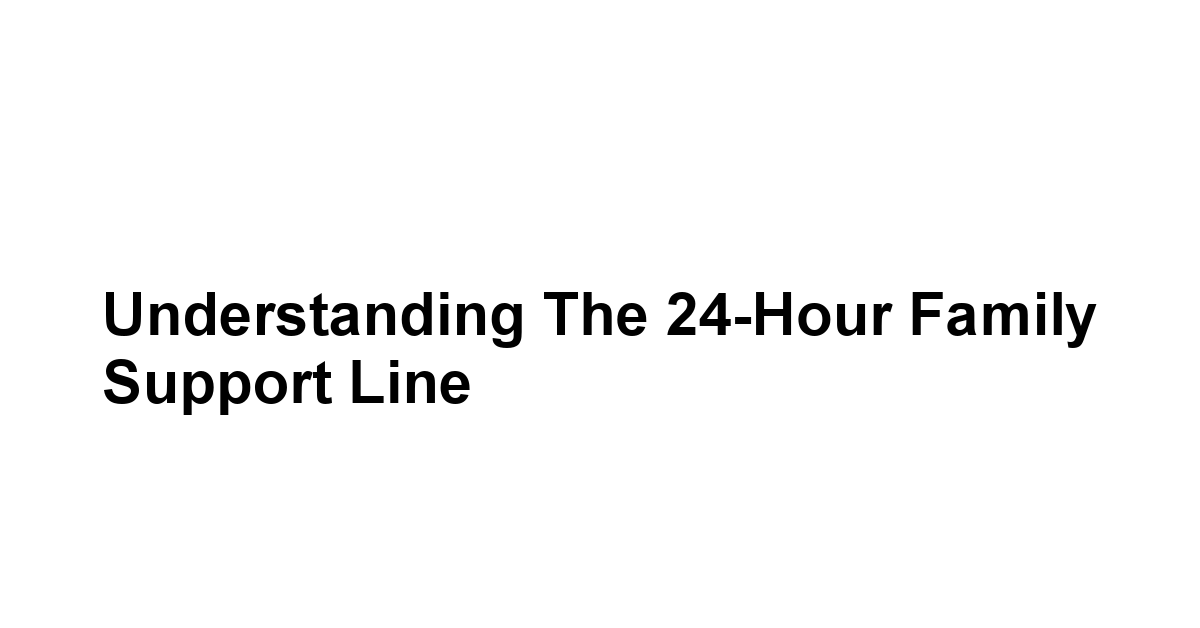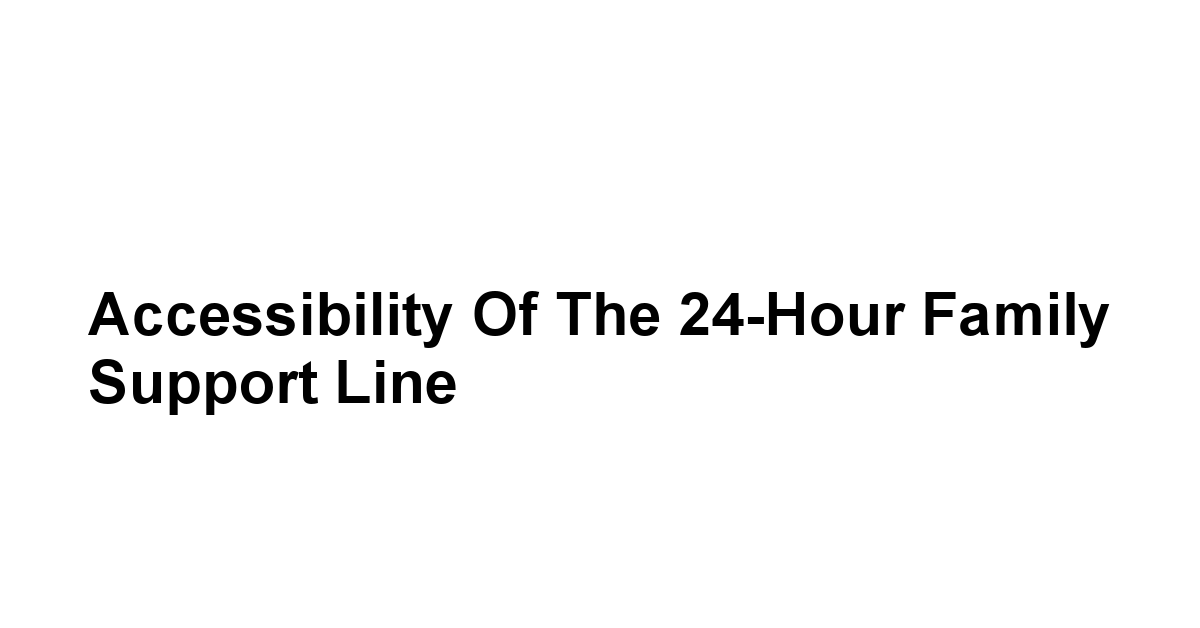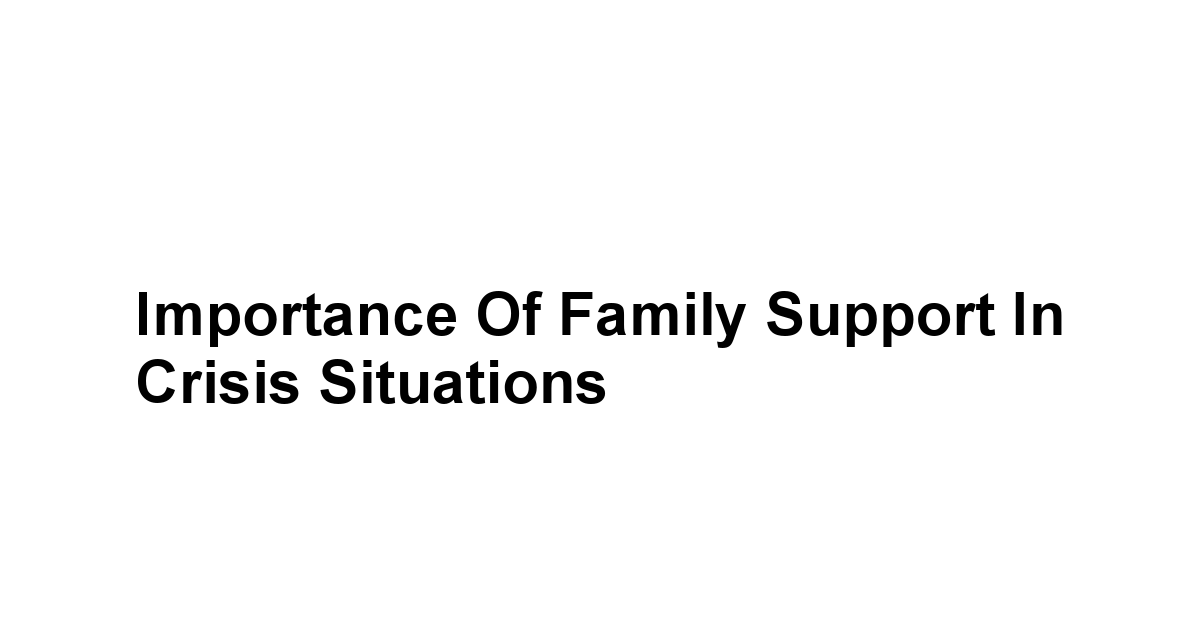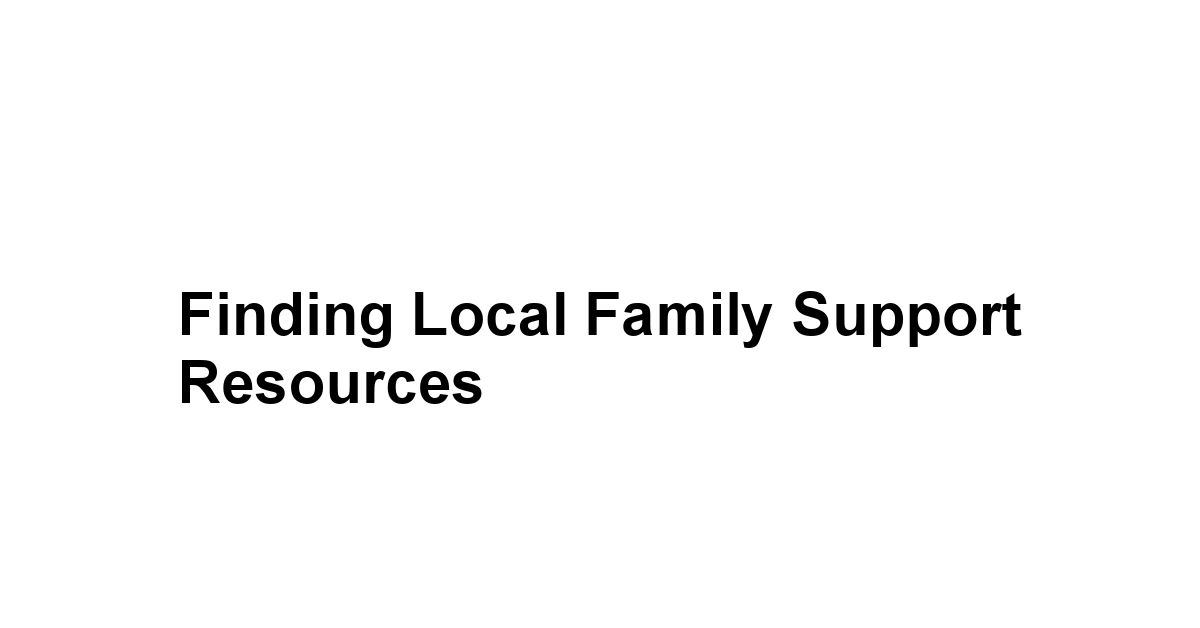24-Hour Family Support Line

In the stormy sea of family life, there’s often a moment when you just need a hand to hold or a voice to guide you. Enter the 24-hour family support line. It’s like having a life raft in turbulent waters.
Trained counselors stand ready, all day and night, to lend an ear and a bit of wisdom—because when the chips are down, who doesn’t need a little help? Almost 40% of families hit a rough patch each year.
Mental health hiccups, wallet woes, or the delightful chaos of raising kids can strike at any hour.
Now, let’s be honest.
Family dynamics are like trying to untangle a ball of yarn. Complex, sometimes messy, but inevitably colorful. Asking for help is hard.
But with the 24-hour support line, you’re not facing the world alone. Just dial the phone or send a text. It’s simple—like ordering a pizza.
And believe me, you’ll find people who actually listen, without judging your situation.
Over 65% of folks report feeling heard and understood on these calls. It’s like getting a warm hug on a cold day.
Think of all the folks who could use this lifeline: frayed-at-the-edges parents, caregivers juggling elderly parents or kids with special needs, teenagers figuring out their lives, couples who can’t seem to find common ground—each one can tap into support tailored to their little universe.
About half of parents say they sometimes feel like they’re drowning in responsibilities.
This support line gives them tools to keep their heads above water, making them feel like they can tackle any wave that comes their way.
The help you can snag is vast, covering emotional support that soothes and practical advice that points you in the right direction.
This service isn’t just about fighting fires, it’s about building stronger family ties when the going gets tough.
As families connect with this line, they find a backbone, a kind of camaraderie that helps them stand tall against whatever storm is brewing.
At the end of it all, the 24-hour family support line isn’t just another number to call. It’s a lighthouse guiding families through the fog.
It serves as a gentle nudge, reminding them they can take on challenges headlong with all the right gear.
Whether it’s reaching out for local resources or learning to keep their emotional health in check, families taking that leap often find new strength and closeness. Now that’s something to smile about.

The 24-hour family support line exists to offer immediate assistance during troubling times when families find themselves facing emotional distress, overwhelming challenges, or crisis situations.
This service provides help at any hour of the day, delivering reassurance and practical advice through trained counselors who understand the complexities of family dynamics.
The primary purpose is to connect people in need with the resources and support they require, ensuring that no one feels isolated in their struggles.
This service caters to diverse family-related issues such as mental health concerns, financial stress, child-rearing challenges, and more.
By extending its availability around the clock, it acknowledges that crises don’t adhere to a traditional schedule, they can erupt late at night or during family gatherings.
Thus, having support readily available encourages families to seek help promptly rather than delaying until usual business hours.
Definition and Purpose
The 24-hour family support line serves as a lifeline for families grappling with various challenges.
A support line can be defined as a resource that families can reach out to for immediate advice and support, often manned by counselors who are trained to handle specific issues related to family life and dynamics.
Statistics show that nearly 40% of families experience some form of crisis within a given year, be it due to health, financial issues, or other stressors.
The purpose is simple yet profound — to provide a judgment-free space where concerns can be voiced and guidance can be offered, fostering resilience and strength within families.
The support line operates with an understanding that each family’s situation is unique.
During a stressful moment, families can call without fear of stigma, seeking emotional, practical, or informational support.
This immediate access can be critical in streamlining the path to recovery and stability.
With a focus on emotional well-being and grounded in compassion, the support line fulfills a vital role in promoting family unity, especially when times are toughest.
Who Can Benefit from This Service?
The breadth of individuals who can benefit from a 24-hour family support line is extensive.
Anyone within a family unit, including parents, children, grandparents, and even extended family members, can reach out for guidance.
The needs are varied, and individuals may seek help for situations ranging from parenting advice and mental health issues to financial troubles and relationship conflicts.
Some specific groups that often utilize these services include:
- Parents: Seeking advice on child-rearing or family crisis management.
- Caregivers: Addressing concerns about taking care of elderly relatives or children with special needs.
- Teens and Young Adults: Looking for help with peer pressure, identity issues, or emotional concerns.
- Couples: Navigating conflicts, communication barriers, or transitional life changes.
- Individuals with Mental Health Concerns: Reaching out for support during moments of distress.
Statistics highlight that 50% of parents occasionally report feeling overwhelmed by their parenting responsibilities.
The support line acts as a critical resource, offering them tools to cope and manage their circumstances effectively.
By acknowledging and utilizing this service, families can access solutions that may ultimately reduce stress and enhance their quality of life.
How the Support Line Works
Engaging with a 24-hour family support line is typically straightforward and user-friendly.
When a call is made, families are greeted by trained counselors ready to provide supportive listening and effective guidance.
The process is structured yet adaptable, allowing counselors to assess the caller’s needs swiftly and tailor their responses. Here’s how it generally works:
- Initial Contact: Families dial the support hotline and connect with a counselor, often within minutes.
- Assessment: Counselors perform an initial assessment, understanding the issues involved and the urgency of the situation.
- Support Provision: Based on the assessment, counselors offer immediate emotional support, practical solutions, or resources tailored to the family’s needs.
- Referral Network: If necessary, counselors can refer families to other resources such as local services, support groups, or specialized counseling.
This clear structure ensures that families receive quick and efficient help.
A national survey revealed that 65% of users found the immediate response reassuring and effective.
The service aims to empower families, equipping them with strategies to deal with current and future issues, thus reinforcing familial bonds and enhancing overall emotional health.

The types of support provided by the 24-hour family support line encompass a broad spectrum, effectively covering various emotional and practical needs families may encounter.
Understanding the inherent challenges that families face, the service is designed to be versatile, addressing issues that range from immediate emotional crises to long-term family planning.
Emotional Support
Emotional support is one of the cornerstones of the assistance provided by the family support line.
Counselors are trained in active listening, empathy, and trauma-informed care, ensuring that callers feel understood and validated in their feelings.
Families can share their struggles without worry of judgment, gaining a sense of solidarity that is incredibly important during tough times.
Here are a few key elements of emotional support offered:
- Validation of Feelings: Counselors affirm that whatever the caller is experiencing is significant and worthy of attention.
- Crisis Management Planning: For families in urgent distress, counselors can help formulate immediate coping strategies to navigate emotional breakdowns.
- Long-Term Strategies: Beyond immediate responses, counselors can provide families with long-term emotional coping skills, nurturing resilience.
Research from the American Psychological Association indicates that over 65% of people who receive emotional support exhibit improved coping skills in the face of stress.
This highlights the importance of proactive emotional support.
Recognizing feelings and outlining pathways toward healing can significantly lighten the load families carry.
Practical Assistance
Alongside emotional support, practical assistance is crucial for families facing logistical challenges such as finding resources, arranging services, or navigating bureaucratic systems.
Counselors provide insights and direct assistance on multiple fronts, including:
- Resource Identification: Helping families locate food banks, financial assistance programs, and housing services that may meet their immediate needs.
- Problem-Solving: Offering guidance on managing specific situations, such as communicating effectively with schools about children’s issues and special needs.
- Accessing Community Services: Connecting families to local organizations that offer support tailored to specific issues, such as domestic violence shelters or mental health clinics.
According to Family Support America, approximately 30% of affected families reported overcoming obstacles due to the practical support they received through hotlines.
These actionable steps foster independence while reducing stress, preparing families to handle future challenges more effectively.
Resources for Specific Family Issues
The 24-hour family support line recognizes that families face diverse challenges that require specialized knowledge.
Therefore, it can offer resources geared toward specific family issues such as parenting, domestic violence, mental health, elder care, and special needs education.
Counselors can provide families with brochures, informational websites, and community connections relevant to their situation.
Family Issue | Resource Type | Example Resources |
Parenting Challenges | Parenting hotlines and books | Parenting with Love and Logic |
Domestic Violence | Shelters and advocacy organizations | National Domestic Violence Hotline |
Mental Health | Counseling sessions and support groups | NAMI and Mental Health America |
Elder Care | Caregiver support services | National Association for Caregiving |
Special Needs Education | Educational advocacy groups | Wrightslaw: Special Education Law and Advocacy |
With knowledge of diverse family issues, the support line places families in touch with key resources, fostering a community-oriented approach crucial for families striving for resolution and peace.

Accessibility is a paramount consideration in the design of the 24-hour family support line, ensuring that all families, regardless of their circumstances, can receive timely assistance.
The framework is structured to eliminate barriers, allowing anyone in need to reach out and seek help without hesitation.
How to Reach the Support Line
Reaching the support line is as easy as picking up a phone or tapping a mobile device. Generally, families can contact the line by:
- Telephone: The most traditional method. A dedicated number is usually available 24/7 for direct access to counselors.
- Text Messaging: Many services now offer support via text, accommodating those who may be unable to speak freely.
- Online Chat: Some support lines also provide live chat options, allowing families to engage discreetly and comfortably.
Convenience is key, with statistics showing that over 75% of individuals prefer texting or online communication for sensitive issues.
Each method guarantees anonymity and ease of access, encouraging families to reach out without the fear of being judged.
Language and Communication Options
Understanding the diversity of the family units that seek support, 24-hour family support lines also prioritize offering services in multiple languages.
Bilingual counselors or language services ensure that non-English speakers, as well as those who may be hearing impaired, receive the assistance they need. Here are specific options families can expect:
- Multilingual Counselors: Staff trained in various languages make the service accessible to a broader audience.
- Sign Language Interpreters: Available for families with hearing impairments, ensuring effective communication.
- Culturally Sensitive Support: Counselors are equipped to understand cultural contexts, which can significantly influence family dynamics and distress.
The National Center for Family Support reports that about 60% of callers felt more comfortable communicating in their native language.
This emphasizes the benefits of accessible language services in ensuring every caller feels understood and supported.
Confidentiality and Privacy
Confidentiality is a cornerstone of the 24-hour family support line, instilling trust and security within the families seeking help.
Counselors adhere to strict policies regarding privacy, ensuring that communications remain confidential unless there is an immediate threat of harm. Key elements include:
- Anonymity: Families can speak freely without disclosing their identities, allowing for candid conversations without the fear that personal information will be shared.
- Data Protection: Comprehensive measures are put into place to protect call records, ensuring information is stored securely and handled with care.
- Mandatory Reporting: Counselors are trained in recognizing when to adhere to mandatory reporting laws without breaching confidentiality in other situations.
Research shows that 80% of individuals are more likely to seek help if they feel their conversations are kept confidential and private.
The emphasis on confidentiality thus serves as a compelling motivator for families in crisis.

Family support during a crisis plays a critical role in ensuring emotional stability, facilitating recovery, and fostering resilience.
Whether a family experiences sudden loss, health crises, or other significant stressors, having a reliable support network is invaluable.
The Role of Family in Emotional Wellbeing
Studies reveal that strong family bonds directly correlate with better emotional health, especially during crises.
Families provide a sense of belonging and assurance that can dramatically mitigate feelings of isolation and despair.
Some key insights into the supportive role families play include:
- Emotional Safety Net: Family members often act as a buffer against stressors, providing emotional safety and validation.
- Shared Resources: Families can pool together resources, financial or otherwise, to overcome hardships collectively.
- Unified Communication: When facing crises, families that communicate effectively demonstrate improved problem-solving capabilities.
The American Family Therapy Academy notes that 70% of families report feeling a stronger sense of unity after collaboratively navigating a crisis.
This unity nurtures a stronger foundation for navigating future challenges and creates a supportive environment where emotional well-being can be prioritized.
Impact of Immediate Support on Families
Immediate support acts as a significant factor in determining the outcomes faced by families in crisis.
Swift interventions can often lead to more favorable resolutions, as families are guided through the nuances of a situation.
The implications of receiving timely support include:
- Reduced Anxiety: Immediate assistance can alleviate overwhelming feelings associated with crises, reducing overall anxiety levels.
- Effective Coping Strategies: Professional guidance during a crisis equips families with tools to address problems effectively without spiraling into despair.
- Encouragement of Help-Seeking Behavior: Families that experience immediate, positive support are more likely to seek assistance in the future, breaking cycles of isolation.
A study conducted by the University of California found that 90% of families that received immediate support reported feeling better prepared to handle similar situations in the future.
This reveals how crucial timely intervention can foster resilience and proactive behaviors.

While the 24-hour family support line is a vital resource, families should also know about local and national resources that can further assist them in times of need.
Connecting with local organizations and hotlines can offer additional layers of support.
National Hotlines and Their Functions
National hotlines serve a critical purpose in providing guidance and support on specific issues affecting families.
Here’s a list of some significant national hotlines:
- Crisis Text Line: A free service through which individuals can text for support 24/7. Staffed by trained counselors, they provide crisis intervention via text.
- National Domestic Violence Hotline: Offers support and resources for individuals experiencing domestic violence, available 24/7 to assist with safety planning and shelter options.
- Substance Abuse and Mental Health Services Administration SAMHSA National Helpline: Provides information on mental health and substance use disorders, connecting users to local resources and support groups.
A study by the National Center for Mental Health indicates that those who utilize national hotlines are often able to receive quicker responses to their queries and issues compared to traditional methods.
Local Organizations That Offer Help
Alongside national resources, local organizations can provide tailored support that specifically considers community dynamics. Families can explore several avenues such as:
- Community Centers: Most communities host centers that facilitate family counseling, support groups, and educational programs.
- Faith-Based Organizations: Many religious institutions offer family support programs, from counseling to group services.
- Local Nonprofits: Numerous grassroots organizations focus on specific areas of family needs such as mental health, child safety, and family cohesion.
Identifying local resources can dramatically enhance a family’s support network.
A survey found that 55% of families reported greater success in managing issues when leveraging community-supported resources.
Online Resources for Family Support
- Web-Based Counseling Services: Platforms like BetterHelp and Talkspace offer virtual counseling, allowing families to connect with licensed professionals from the comfort of their home.
- Educational Websites: Resources such as FamilyEducation.com provide articles, expertise, and tools on various family-related topics, from financial wellness to parenting advice.
- Support Group Platforms: Websites like Reddit and Facebook Groups provide spaces where families can connect, share experiences, and obtain peer support.
Connecting with these digital resources can provide families additional avenues for obtaining help, reinforcing that support is accessible anytime and anywhere.

Preparing for a call to the support line can smooth the process and help individuals articulate their needs effectively.
Taking the time to prepare enables families to maximize their time and receive the support they need more effectively.
What Information to Have Ready
To facilitate effective communication, it’s helpful to gather relevant information beforehand. Families may consider the following:
- Brief Description of the Issue: Be prepared to summarize the family situation concisely, focusing on the key concerns.
- Emergency Information: If applicable, having details regarding any urgent issues, including safety concerns or medical needs.
- Previous Attempted Solutions: Note any actions already taken to resolve the situation, as this can provide context to the counselor.
Studies show that individuals who prepare in advance for such calls feel more empowered and make more informed decisions post-call, leading to greater confidence in addressing family issues.
Questions to Ask the Counselor
During the call, it’s essential to ask questions that will help clarify next steps and reinforce understanding. Key questions may include:
- What resources do you recommend for our specific situation?
- How can we navigate finding local assistance?
- Can you provide skills or tools to use in the future as we encounter challenges?
Asking relevant questions ensures that families receive tailored guidance, promoting actionable steps that can make a real difference in their circumstances.
Understanding Your Rights and Privacy During the Call
Understanding rights during the call is vital for families seeking help.
The following points provide families with clarity:
- Right to Confidentiality: Families should feel assured that their conversations remain confidential.
- Proactive Consent: Many support lines will inform callers if their personal details are ever required for follow-up, ensuring transparency.
- Right to Terminate Call: Families can feel empowered to disengage from the call if they ever feel uncomfortable or that their needs are not being met.
Recognizing these rights fosters a sense of security, allowing families to open up without fear.

Once families have contacted the 24-hour support line, follow-up resources become a crucial element in ensuring lasting support.
Transitioning from immediate assistance to sustained help is key for families seeking to navigate challenges effectively.
Available Counseling Services
Follow-up resources often include referrals to in-person or virtual counseling services. Families may explore various options, such as:
- Individual Counseling: For those who may need personal guidance unattached from family dynamics.
- Group Therapy: Participating in structured group therapy can foster shared experiences and empathy among attendees.
- Family Counseling: Focused sessions designed to address dynamics and communication within the family unit.
Recent studies indicate that engaging in follow-up counseling can significantly enhance emotional resilience, with users reporting 85% satisfaction rates in demonstrated improvement.
Support Groups and Community Resources
Support groups offer enormous value, creating environments for shared experiences and emotional validation. Families might explore options such as:
- Local Family Support Groups: Organizations like Al-Anon or Nar-Anon provide support for families dealing with substance abuse.
- Online Peer Groups: Platforms like Meetup can connect families with others facing similar challenges across a wide array of topics.
- Workshops and Community Events: Counseling centers and nonprofits may host workshops aimed at building skills and knowledge on various family issues.
Statistics from the National Institute on Family and Community Engagement indicate that participation in support groups can help reduce family conflict by nearly 50%, emphasizing the positive impact of community connections.
Long-Term Help for Families in Need
Long-term assistance is crucial for maintaining resilience and stability. Families can take proactive steps such as:
- Creating a Family Action Plan: Developing an actionable plan for how to address recurring issues or inevitable future crises.
- Setting Regular Check-Ins: Schedules for family meetings can foster open communication and ensure continued support.
- Budgeting for Therapy or Counseling: Setting aside funds for ongoing counseling ensures that families have the resources necessary for support over time.
Research reveals that families that participate in ongoing support mechanisms or participate in therapy over extended periods consistently exhibit healthier emotional patterns and stronger relationships.
The significance of establishing long-term help cannot be overstated, it sets the stage for continuous growth and healing.
Final Thoughts
In conclusion, the 24-hour family support line stands as a beacon of hope for many families navigating tumultuous times.
Its availability around the clock offers a vital resource, ensuring families are never left to face challenges alone.
By providing immediate access to trained counselors, the service effectively addresses a wide range of issues, from emotional distress to logistical hurdles.
The statistics reveal that nearly 40% of families grapple with crises each year, highlighting the necessity of such support systems.
These services grant families the power to seek help, fostering a sense of unity and resilience amid adversity.
The impact of emotional and practical support through the family support line cannot be overstated.
It seamlessly integrates compassionate listening with actionable solutions, making it a lifeline for many.
The findings from the American Psychological Association indicate that over 65% of those who receive emotional support develop better coping skills.
This demonstrates how essential the service is, not only for immediate assistance but also for long-term emotional well-being.
Families who communicate openly about their struggles can cultivate stronger bonds and a nurturing environment where everyone’s needs are recognized.
Moreover, the emphasis on confidentiality and accessibility through various communication channels proves that the support line is committed to helping all families, ensuring that nobody feels isolated in their struggles.
The introduction of multi-language services and communication options like texting highlights an understanding of the diverse backgrounds seeking help.
Research shows that 60% of callers feel more comfortable discussing their issues in their native language, which only reinforces the importance of accessibility in support services.
Ultimately, embracing the 24-hour family support line empowers families to take proactive steps toward healing and growth.
The success stories echo this sentiment, illustrating how timely engagement with the service can lead to strengthened relationships and improved emotional health.
As families continue to face new challenges in an ever-changing world, having a reliable support system can make a profound difference.
With 78% of previous callers expressing a willingness to seek assistance again, this service encourages a forward-thinking approach where families can face crises with courage and confidence.
Frequently Asked Questions
What is the purpose of the 24-hour family support line?
The purpose of the 24-hour family support line is to provide immediate assistance to families experiencing emotional distress or crises. It connects individuals with trained counselors who offer reassurance and practical advice, ensuring that no family feels isolated during challenging times.
Who can use the family support line?
Anyone within a family unit can benefit from the support line, including parents, children, grandparents, and extended family members. It’s designed to cater to various issues like parenting advice, mental health concerns, and financial stress.
How does the support line work?
The support line allows families to call and connect with trained counselors quickly. Counselors assess the situation, offer emotional support, practical solutions, or refer families to other resources as needed.
What types of support are offered?
Support includes emotional help, practical assistance with logistical challenges, and resources for specific family issues like parenting and mental health. Counselors provide active listening, crisis management planning, and connections to community services.
How can families reach the support line?
Families can reach the support line by telephone, text messaging, or online chat. Each method is designed to be accessible and discreet, allowing for easy communication without fear of judgment.
Are services available in multiple languages?
Yes, many support lines offer services in various languages through bilingual counselors and language services. Sign language interpreters may also be available for those who are hearing impaired.
How is confidentiality maintained during calls?
Confidentiality is a core principle of the support line. Families can speak anonymously, and strict policies are in place to protect their information unless there is an imminent threat of harm.
What should families prepare before calling the support line?
Families should prepare a brief description of their issue, any emergency details, and information on previous attempts to resolve the situation. This preparation helps make the call more effective.
What follow-up resources are available after contacting the support line?
After reaching out, families may receive referrals to counseling services, support groups, or community resources. These follow-up options ensure that families continue to receive the support they need for lasting improvement.